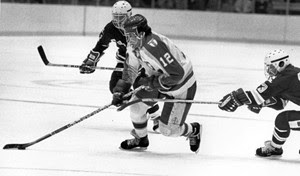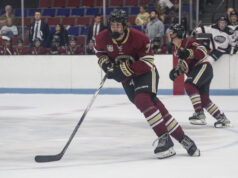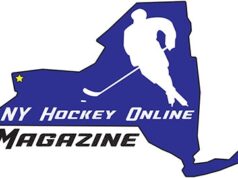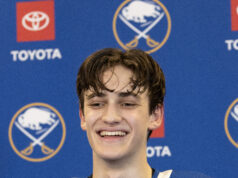By Bob Duff / Special to NHL.com–
Nearly two decades later, Jim Devellano is frank in his assessment of the most foolish move he ever made as an NHL general manager.
The decision to trade Adam Oates continues to haunt him.
“It was the worst trade I ever made,” said Devellano, now the senior vice president of the Detroit Red Wings.
On June 15, 1989, Devellano, then the Red Wings GM, traded Oates and forward Paul MacLean to the St. Louis Blues for forwards Bernie Federko and winger Tony McKegney.
Jacques Demers, Detroit’s coach at the time, felt Federko, a 1,000-point scorer in the NHL and a future Hall of Famer, would take some of the offensive burden off Red Wings captain Steve Yzerman.
“We had the chance to pick up a veteran who had played for Jacques in St. Louis,” Devellano said. “We thought he would add a leadership element, but we were wrong. Bernie didn’t have too much left in the tank.”
Meanwhile, Oates teamed up with Brett Hull in St. Louis, launching both players to the Hall of Fame.
“He stuck it to us eight times a year,” Devellano said. The Blues and Red Wings were Norris Division rivals then. “It made me look like a pretty dumb GM.”
As he set up one goal after another with his uncanny knack for finding open teammates, Oates, who was not selected in the NHL Draft, made the hockey people who didn’t think he was worthy of a pick also look quite foolish.
Among his NHL contemporaries, Wayne Gretzky was The Great One and Mario Lemieux was The Magnificent One. Oates would best be described as The Overlooked One.
He was unwanted by major junior clubs and instead played Tier II junior hockey in Markham, Ontario, where he had a league-leading 105 assists and 159 points for the Waxers in 1981-82.
Still, Rensselaer Polytechnic Institute in Troy, New York, was the only NCAA team to pursue him.
“I couldn’t get any other school to look at me,” Oates said.
The native of Weston, Ontario, played three seasons at RPI and signed a free agent contract with Detroit on June 28, 1985. Since the draft era began in 1963, only Gretzky (2,857) had more points than Oates (1,420) among undrafted NHL players. Only three centers in NHL history — Gretzky (1,963), Ron Francis (1,249) and Mark Messier (1,193) — had more assists than the 1,079 Oates had in 1,337 NHL games.
“To me, he is the most underrated player that ever played the game,” Hull said. “Besides the obvious, Wayne Gretzky, I think he’s the smartest player that ever played the game.
“He loved to pass the puck and was extraordinary gifted at passing the puck.”
Like most youngsters, Oates was heavily influenced on his sporting path by advice from his father, but David Oates’ words of wisdom to his son came from watching a different sport.
“My dad is British and he was a soccer player,” Oates said. “He grew up watching [Sir] Stanley Matthews, who was a legend over there, a Gretzky over there.”
Actually, it sounds more like Matthews was the Oates of English soccer, a brilliant player known for his pinpoint passes and innate ability to make those around him better.
“My father told me, ‘If you can be unselfish, your teammates will like you,'” Oates said. “It became my role, becoming a playmaker out of that.”
It’s safe to say his teammates liked him. A lot.
Hull twice scored 50 goals in 50 games — in consecutive seasons (1990-91 and 1991-92), doing it the first time in 49 games — taking feeds from Oates. (Skating on the wing with Oates in 1993-94, Cam Neely also had a 50-in-50 season — actually 49 games — for the Boston Bruins.)
From the beginning of the 1990-91 season until Feb. 6, 1992, the day before Oates was traded to the Boston Bruins, Oates assisted on 71 of Hull’s 140 goals (51%).
“We had such great chemistry on and off the ice,” Hull said of himself and Oates. “I don’t know, it was like a quarterback and a receiver where he just knows where he’s going to be.
“That’s the way we were.”
Hull and Oates, as they became known, made beautiful music together on the ice.
“At the time, Brett and I took off,” Oates said. “The year he scored 86 (1990-91) was just magical. Every single night, wherever we went he scored a goal, two goals. He got four hat tricks.
“We hit it off as buddies and understood each other. The chemistry was just excellent.”
The 90 assists by Oates during that 1990-91 season are still a Blues single-season record.
“I played in an era of unbelievable players,” former Colorado Avalanche captain Joe Sakic said. “Wayne Gretzky was the best to play the game, but it was Adam Oates for playmaking.
“Adam and Brett, the magic and chemistry they had, he made everyone around him better. He was one of the best playmakers of all time.”
After being traded to the Bruins, Oates scored 142 points in 1992-93 to finish third in the Art Ross Trophy voting, and his 97 assists were second in Boston history (Bobby Orr had 102 in 1970-71). He led the NHL that season with 97 assists.
Oates topped the League with 69 assists in 2000-01 with the Washington Capitals and did it for a third time with 64 in 2001-02, which he split between Washington and the Philadelphia Flyers.
Capitals center Adam Oates #77 sets for the faceoff in a game at the Molson Centre during the 1996-97 season (Photo by Denis Brodeur/NHLI via Getty Images)
Oates (two), Gretzky (13), Lemieux (four), Orr (two) and Joe Thornton (two) are the only players in NHL history to have more than one 90-assist season.
“That’s pretty good company to keep,” Oates said. “I don’t mind being on that list at all.”
All this from a guy viewed as too small and too slow to make it in the NHL.
“I was a Toronto kid, kind of a late bloomer, and scouts look at big kids, fast kids,” Oates said. “I slipped through the cracks.
“It allowed me to go to college.”
At RPI, Oates led the Engineers to the NCAA championship in 1984-85 and set school single-season records with 60 assists and 91 points. His 150 career assists are also a school record and he was a two-time First-Team All-America selection.
“He’s a legend at RPI,” said former NHL forward Joe Juneau, who followed Oates to the Engineers and later was his teammate in Boston and Washington. “He was one of the best passers in the game.
“A lot of people overlook him, because he was a different kind of player, not flashy like Lemieux or Gretzky. But I think that anybody who knows hockey knows that in his day, Adam Oates was one of the top five players in the game.”
Oates believes he would have never had NHL success without both the life and hockey lessons he learned during his college days.
“Going to RPI was an important time for me,” Oates said. “I was too old to play juniors. I was a young, cocky kid coming out of Tier II. I was fortunate to have the time for my game to mature. I got to play 19 years in the league. I was very fortunate. I could have gone in another direction.”
Oates perhaps could have fashioned a life in Canada’s other national game. He was a high-scoring junior star in the Ontario Lacrosse Association but gave up the sport in 1984 to focus on hockey.
After signing with Detroit in 1985, Oates was slow to evolve as an NHL player, and his style of game didn’t seem to fit into the grinding, checking system preferred by Demers.
His best season in Detroit was his last; Oates had 78 points in 1988-89.
“Adam played for us for four years,” Devellano said. “He was OK, but we thought he should have gone beyond where he was.”
He did exactly that after leaving the Red Wings, going on to play in the Stanley Cup Final with Washington in 1998 and the Mighty Ducks of Anaheim in 2003.
16 Jun 1998: Adam Oates #77 of the Washington Capitals shakes the hand of Steve Yzerman #19 of the Detroit Red Wings during the Stanley Cup Finals game at the MCI Center in Washington, D. C.. The Red Wings defeated the Capitals 4-1. Mandatory Credit: Rick Stewart /Allsport
Once Oates got over the shock of the move from Detroit, it proved to be the wake-up call he needed.
“When I got traded I was really upset,” Oates admitted. “It was heartbreaking. Detroit was my first team. You’re sentimental. You don’t think you’re ever going to leave. (Red Wings owner) Mr. [Mike] Ilitch was fantastic the way he treated the team.
“But it gave me the chance to go to St. Louis and play with Brett and really establish myself in the League. I think it jump-started my career.”
All the way to the Hockey Hall of Fame, where Oates was inducted in 2012.
After stints coaching the Capitals and New Jersey Devils, Oates works as a roving skills consultant and lists NHL players Steven Stamkos, Alex Ovechkin, Zach Parise and Ryan Suter among his clients.
Even in retirement, the world’s best hockey players can count on Oates for an assist.
(Reprinted with permission of NHL.com)







